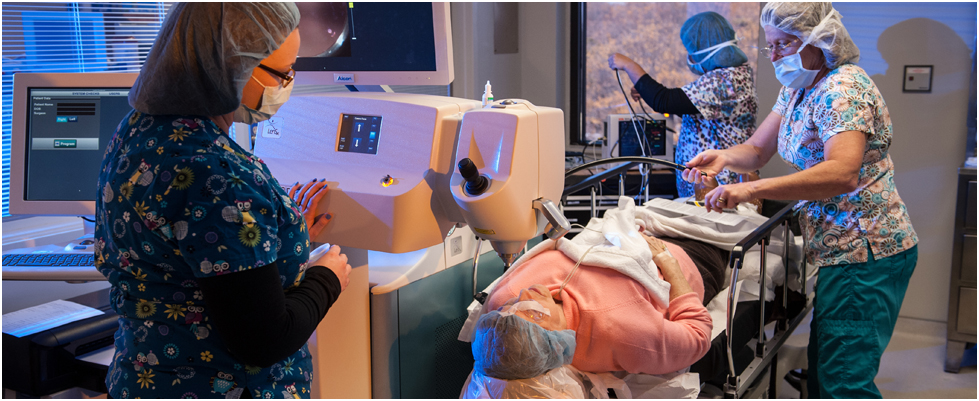About Cataract Surgery
Cataract Surgery is safe, effective, predictable and quite common, especially among seniors and our growing “baby boomer” population. Cataract surgery to remove the opaque lens and replace it with a permanent artificial lens implant is one of the most common surgeries performed in the U.S. today and is regarded as a very successful procedure for cataract treatment.
Lifestyle & Safety Benefits of Cataract Surgery
Some patients may think that cataract surgery and lens implants only help decreased vision, but there is potentially much more lifestyle and safety benefit for patients. Unfortunately, vision loss in seniors often leads to social isolation, depression, mental decline and can even increase the risk of falling and hip fracture. Further, patients with cataract related vision loss who have had cataract surgery to improve their sight are living longer than those with visual impairment who chose not to have the procedure, according to research published in Ophthalmology, the journal of the American Academy of Ophthalmology. In fact, the researchers found a 40 percent lower long-term mortality risk in those who had the cataract surgery. If cataracts have made completing everyday tasks difficult if you are having difficulty with night driving or feel your are not quite as mobile as you would like-cataract surgery should be discussed to help determine the best course of action.
Cataract Surgery at Baltimore Washington Eye Center
At Baltimore Washington Eye Center, our cataract surgeons combine the use of a small incision, “no stitch, no patch” technique that can be performed with the femtosecond laser on an outpatient basis to provide you with laser cataract surgery in our comfortable, convenient and close to home AAAHC, Medicare and State of Maryland certified ambulatory surgery center. The Baltimore Washington Eye Surgery Center is dedicated to the performance of state-of-the-art eye surgery. The entire process usually requires only two hours of your time from start to finish. The actual surgical procedure is painless and takes less than 15 minutes. Our nurses and staff are present to help us with your actual surgery as well as to assist you and make your experience as pleasant as possible.
The Cataract Surgery Procedure
Our cataract surgeons have incorporated the use of the LenSx® Femtosecond Laser to perform many steps in the cataract surgery procedure. Your cataract operation will begin with a few sets of drops being placed in your eye to dilate your pupil. Your eye will then be treated with an anesthetic drop to numb the surface of your eye so that you will feel little if anything during your surgery. In addition, you may be given a tablet to swallow to help you relax
Next, your cataract surgeon will make a very small incision at the outermost edge of your cornea. This incision will be just large enough to allow a microscopic instrument the size of a pen tip to pass through it. It is possible for your cataract surgeon to make this tiny incision with a traditional instrument, or with the laser if you are having laser cataract surgery.
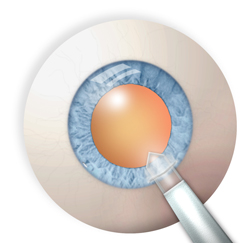
Then, your eye surgeon will gently pass a microscopic instrument through the tiny incision and create an opening in the capsule of the crystalline lens to allow access to the cloudy lens material.
This step, called “capsulotomy” also can be performed by your surgeon either manually or with the laser if you are having a laser cataract surgery procedure. If you are having laser cataract surgery, as part of this step the cloudy lens material will be softened with laser energy to make it easier to remove gently.
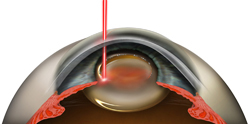

Next, your cataract surgeon will gently pass another sophisticated high technology microscopic instrument through the tiny incision. Sound waves or “Ultrasound” energy produced at the tip of the instrument will be used to gently break the cataract into pieces small enough to be drawn through the instrument and removed from your eye. This cataract removal technique is called “phacoemulsification” and is preferred for most patients.
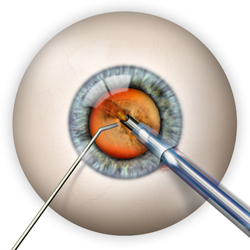
After the cataract has been removed, your eye surgeon will be able to insert a new, crystal clear permanent Intraocular Lens Implant (IOL) into your eye. The replacement lens will actually be inserted and placed in the correct position through the same tiny incision at the outer edge of the cornea through which the surgeon removed the cataract.
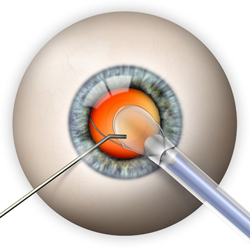
Upon completion of your cataract and lens implant surgery, your surgeon will have one of the surgery center staff members take you to a comfortable place where you will be able to rest and relax prior to going home. After resting for a short while, a surgery staff member will give you permission to have a family member or friend drive you home.
Your surgeon will arrange to see you within 24 hours of your cataract and lens implant surgery so they can examine you in order to confirm that you are healing and seeing as planned. The doctors will also prescribe some eye drops for you to use and may ask you to wear a protective shield, mainly at night, to remind you not to accidentally rub your eye. Although each patient will heal a little bit differently, the majority of patients having cataract surgery at Baltimore Washington Eye Center are able to see well enough to return to their routine daily activities within a day or so after their cataract surgery.
An Important Note about Cataract Surgery
A significant number of men in their 50’s and 60’s and beyond experience an enlarged prostate as part of the aging process. Today, many of men are taking the prescription medication Flomax® or other similar medications that are members of the class of drugs called “alpha-antagonists” or “alpha blockers”. These may include Hytrin® (terazosin), Cardura (doxazosin), Flomax® (tamsulosin), Uroxatral® (alfuzosin) and Rapaflo® (silodosin).
IT IS VERY IMPORTANT THAT YOU NOTIFY OUR STAFF BEFORE YOU HAVE CATARACT SURGERY IF YOU ARE TAKING ANY MEDICATION FOR AN ENLARGED PROSTATE
Certain medications commonly used to treat an enlarged prostate can cause abnormal movement of muscles controlling the opening and closing of the Iris. During cataract surgery, the pupil must stay enlarged or dilated to allow your cataract surgeon to easily view the Crystalline Lens. Flomax® and certain other alpha-blockers including Hytrin®, Cardura and Uroxatral® in particular can interfere with pupil dilation, creating a condition known as Intraoperative Floppy Iris Syndrome (IFIS).
If you have taken or are taking one of these medications and alert any member of our staff, your surgeon will be able to take extra care to make sure the pupil stays dilated to prevent unexpected complications during your cataract surgery.
If you, a family member, or friend wishes to learn more about cataract surgery or wish to be checked for cataracts please contact us to arrange a cataract evaluation by calling Baltimore Washington Eye Center at 800-495-3937.

